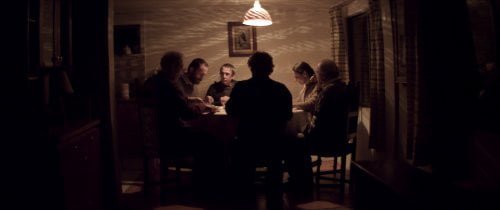The Club

In the Chilean seaside town of La Boca, four men live quietly with the woman who takes care of them while keeping rigid household rules. But the arrival of a fifth man exposes the identities of those within when his former altar boy, Sandokan (Roberto Farías, "No"), follows him, screaming a gruesomely detailed history that will focus official attention on "The Club."
Laura's Review: B+
Cowriter (with Guillermo Calderón and Daniel Villalobos)/director Pablo Larraín ("Tony Manero," "No") has been making films exposing the evils which rotted his country during the Pinochet dictatorship. Now he turns his sights on the Catholic Church, customized with echoes of that regime. The 2015 Berlin Silver Bear winner is one uncomfortable sit, ambiguous in both the motivations of the spiritual advisor/head shrink Father García (Marcelo Alonsom, "The Dance of Reality") and what our own emotional response to these 'priests with a secret' should be. In the modest yellow house in the blue/gray landscape, Father Vidal (Alfredo Castro, "No") delights in his greyhound, Rayo. He trains him on the beach and the entire household travels to race him, Sister Mónica (Antonia Zegers, "No") dealing with official duties as he and Fathers Ortega (Alejandro Goic, "The Maid"), Silva (Jaime Vadell, "No") and Ramírez (Alejandro Sieveking, "The Dance of Reality") watch from a hillside. They are joyous when he wins, but back at the house Mónica reminds them that they may only go outside from 6:30-8:30 a.m. and 7-9 p.m., that they may communicate with no one from outside the home, handle money, self flagellate or self pleasure. They keep to a schedule which includes prayer and singing and seem content, although Ramírez clearly suffers from dementia. Everything changes when the sad-faced Father Lazcano (José Soza) is introduced to the household. When Mónica is unsuccessful at getting his accuser to stop shouting outside, she indicates that he should do so. What Lazcano does instead shocks everyone, instigating the arrival of the stone-faced García, who is given an alternate version of events. He questions each of the home's occupants, Larraín framing them in closeup, as we hear justifications for illegal adoptions, child abuse and baby snatching (the addled Ramírez spits back snippets of Sandokan's incrimination). As the group huddles, convinced García intends to close their home, García begins to make demands, banning alcohol after witnessing Ortega's drunkenness, suggesting Rayo must go. Yet how innocent is their judge, whom the men note carries credit cards and wears designer cologne? Larraín plays devil's advocate with our response, presenting these men with evil in their pasts as essentially peaceful, caring for stray dogs and each other. What will happen to these men and woman the Church has swept under its clerical robes? Will their informal prison (and they do recognize it as such) be replaced with another? But Larraín isn't about to let anyone off the hook, as he builds background tension keeping an eye on the disturbed Sandokan, who has shakily settled in La Boca, a pariah of a different kind. "The Club's" climax is a horrific night of sacrifice of the innocents, one which casts García's motivations into even murkier territory, an agent of surface dogma. While the film is difficult to watch on several levels, its cast is compelling, each engendering pity and revulsion with full characterizations which nonetheless retain an air of mystery. Larraín refuses easy answers, keeping us off balance, prodding the sorest points of human self survival. Grade:

